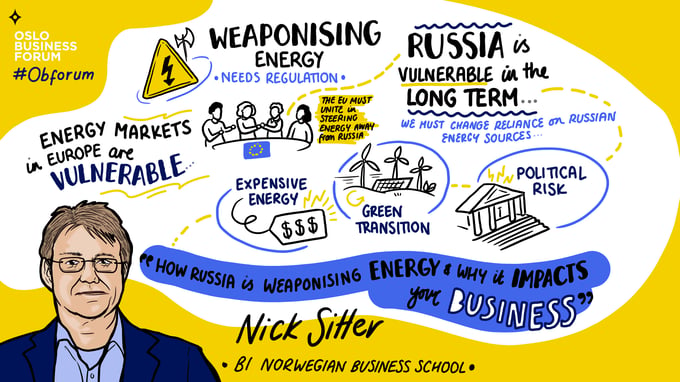Nick Sitter is a Professor of Public Policy at the CEU, a Professor of Political Economy at the BI Norwegian Business School, and a research associate at the LSE Centre for Analysis of Risk and Regulation. He holds a Ph.D., MSc, and BSc (Econ) from the London School of Economics and Political Science. His research interests include EU public policy, energy policy, political party systems, and security.
At Oslo Business Forum, Nick illustrated how Russia is weaponizing energy and what that means for countries and companies reliant on Russian-controlled pipelines.
What does it mean to weaponize energy?
Since the start of the war between Russia and Ukraine, Vladimir Putin has been accused of weaponizing energy. And across Europe, fear has risen that countries may be unable to mount an effective response to his aggression.
The problem, Nick says, is that energy is more than an ordinary commodity. It is both a private and a public good. Perhaps even more importantly, it is a strategic good, one that can cause or sustain conflict. Leaning into this, Russia is weaponizing energy in a way that may have significant impacts on the economy and society, as well as climate change and security.
As threats linger, what does this mean for European businesses? Nick offered leaders several considerations to increase awareness and mitigate risks.
The effects of weaponizing energy
Nick recalls that most of the headlines following Russia's invasion of Ukraine in February 2022 focused on vulnerability. It turns out that nearly one-third of the gas the European Union uses is sourced from Russia—and gas makes up nearly 40 percent of the Russian budget.
There are two sides to this coin. On one side, European countries are vulnerable because of the degree to which they rely on Russia for buying energy. On the other side, Russia is vulnerable because of how deeply its economy depends on selling energy.
Looking at past versus current state, Nick points out that Russia has shifted its approach from offering differential pricing across the EU to cutting the supply to perceived enemies while opening the supply to perceived allies. The effects of weaponizing energy in this way are far-reaching for the economy, society, and politics, with the potential to spike inflation, spark protests, and shape future governments and policies.
.jpg?width=2000&name=Kopi%20av%20Kopi%20av%20MaxEmanuelson_OsloBusinessForum_MAX09193%20(1).jpg)
What is the effect on European businesses?
Is expensive energy here to stay? Will we see high prices for the long term, or will we return to some kind of normal? Nick believes that the answer most likely lies somewhere in the middle. And given that uncertainty, businesses must be aware of the potential impacts.
As the Russia-Ukraine war continues, countries may begin to rely more on other gas pipelines, including the EU LNG. While it reduces reliance on Russia, purchasing gas from these alternative suppliers is more expensive and may come with additional consequences, such as increased subsidies, regulation, and rationing.
A prolonged energy crisis may also accelerate the EU's move to renewable or sustainable ("green") energy sources. This presents new, strategic logic for a transition already in motion and is likely to advance in-progress policymaking efforts.
Nick also pointed out the political risk associated with prolonged high energy prices, including the potential for environmentally and geopolitically stranded assets. The threat of companies owning but unable to use their energy assets can result in significant write-downs, devaluations, or liabilities.
What are the long- and short-term dynamics?
Nick discussed the vulnerability of both the EU and Russia in the present scenario and, looking to the future, believes there are both short-term and long-term impacts.
The EU is more vulnerable in the short term as it anticipates Russia's next move and navigates future planning. Countries are currently wrestling with questions about pipelines, storage, interconnection, and help for consumers.
Russia, however, is more vulnerable in the long term as it faces counterattacks and European countries identify more reliable and sustainable solutions.
In conclusion, Nick asked, "What can the EU and Norway do?" He believes there are three approaches. The EU could return to the pre-2022 liberal order, adopt a more robust liberal order, or turn to state intervention. Each path comes with risks and benefits, and the only opportunity to predict the future will be to continue watching key policymakers.
Key Points
- Russia has been accused of weaponizing energy by threatening to cut off gas supplies to countries that rely heavily on Russian-controlled pipelines.
- This threat leaves many European countries—and companies—in a vulnerable position and forced to consider ways to mitigate the risk.
- The potential impacts businesses must monitor include an accelerated transition to renewable and sustainable (green) energy sources and the potential for stranded assets.
- While the EU is vulnerable in the short term as it navigates the present crisis, Russia is more vulnerable in the long term as countries identify alternative solutions.
Questions to Consider
- From an economic perspective, how have rising energy costs affected your business?
- How might the societal and political impacts of rising energy prices impact your business?
- What do you speculate is the right approach to mitigating the current crisis?

Want to be a part of the OBF community? Join Oslo Business Forum 2023: Thriving in Chaos now!.png?width=680&name=CTA_2023%20(2).png)